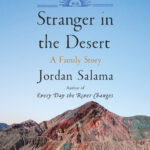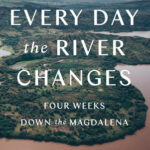Jordan Salama

JORDAN SALAMA is a writer covering culture and the environment in the Americas. He is the author of Every Day the River Changes, a journey down Colombia's Río Magdalena, which was named a Kirkus Reviews Best Book of 2021. His essays and stories have appeared in National Geographic, The New York Times, Smithsonian, Scientific American, NPR's All Things Considered and other publications. Most recently, his story “The Candy Sellers,” an investigation into the lives of migrant families selling candy on the NYC subway, was on the cover of New York magazine. He lives in New York.
Subscribe to our newsletter for news & events from Catapult.
Books
Stranger in the Desert
A Family Story
Inspired by family lore, a young writer embarks on an epic quest through the Argentine Andes in search of a heritage spanning hemispheres and centuries, from the Jewish Levant to turn-of-the-century trade routes in South AmericaOne Thanksgiving afternoon at his grandparents’ house, Jordan Salama discovers a large binder stuffed with yellowing papers and old photographs—a five-hundred-year wandering history of his Arab-Jewish family, from Moorish Spain to Ottoman Syria to Argentina and beyond.
One story in particular captures his attention: that of his great-grandfather, a Syrian-born, Arabic-speaking Jewish immigrant to Argentina who in the 1920s worked as a traveling salesman in the Andes—and may have left behind forgotten descendants along the way. Encouraged by his grandfather, Jordan goes in search of these “Lost Salamas,” traveling more than a thousand miles up the spine of South America’s greatest mountain range.
Combining travelog, history, memoir, and reportage, Stranger in the Desert transports readers from the lonely plains of Patagonia to the breathtaking altiplano of the high Andes; from the old Jewish quarter of Damascus to today’s vibrant neighborhoods of Buenos Aires. It is also a fervent journey of self-discovery as Salama grapples with his own Jewish, Arab, and Latin American identities, interrogating the stories families tell themselves, and to what end.
Every Day The River Changes
Four Weeks Down the Magdalena
An exhilarating travelogue for a new generation about a journey along Colombia’s Magdalena River, exploring life by the banks of a majestic river now at risk, and how a country recovers from conflict."Richly observed." —Liesl Schillinger, The New York Times Book Review
An American writer of Argentine, Syrian, and Iraqi Jewish descent, Jordan Salama tells the story of the Río Magdalena, nearly one thousand miles long, the heart of Colombia. This is Gabriel García Márquez’s territory—rumor has it Macondo was partly inspired by the port town of Mompox—as much as that of the Middle Eastern immigrants who run fabric stores by its banks.
Following the river from its source high in the Andes to its mouth on the Caribbean coast, journeying by boat, bus, and improvised motobalinera, Salama writes against stereotype and toward the rich lives of those he meets. Among them are a canoe builder, biologists who study invasive hippopotamuses, a Queens transplant managing a failing hotel, a jeweler practicing the art of silver filigree, and a traveling librarian whose donkeys, Alfa and Beto, haul books to rural children. Joy, mourning, and humor come together in this astonishing debut, about a country too often seen as only a site of war, and a tale of lively adventure following a legendary river.
Catapult | Counterpoint | Soft Skull | Hawthorne Books
20 Jay Street #704
Brooklyn, NY 11201
646.926.0805 | contact@catapult.co
20 Jay Street #704
Brooklyn, NY 11201
646.926.0805 | contact@catapult.co







